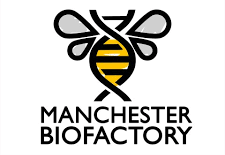Impact, Innovation and Translation
PROVIDING BIOLOGICAL SOLUTIONS FOR INDUSTRIAL PROBLEMS
SYNBIOCHEM is housed in the Manchester Institute of Biotechnology (MIB), a leading UK/EU industry-interfaced biotechnology institute and widely acknowledged beacon of interdisciplinary bioscience. Our SynBio research focus for Industrial Biotechnology (IB) and chemicals manufacture at Manchester has a major role to play in delivering the UK’s vision for the bio-based economy, especially in bio-based chemicals manufacture, bio-therapeutics and novel bio-materials.

SYNBIOCHEM PIPELINE
Our D/B/T/L technology platforms are underpinned with in-depth chemical expertise/understanding and coupled to RRI. We can offer access to our computational design tools, novel parts (enzymes/regulatory tools), Build/Test platforms, methodologies and “know-how” and have interdisciplinary expertise to help address your industrial challenges.

PATENTS AND PUBLICATIONS
In addition to major scientific peer reviewed publications (see SYNBIOCHEM Publications), new patents (>10) including the biosynthesis of aromatic polyketides, monoterpenoids, monoterpene synthases, 2 spin-out companies have been formed.
Patents: Whilst predominantly working at TRLs 1-3 the Centre has also focused attention to the translation of its science and technologies to maximise innovation impact. 10 patents have been filed which include routes for the microbial biosynthesis of aromatic polyketides, monoterpenoids, propane production and conversion from CO2 to ethanol.

SPIN OUTS
Following the commercialisation success of the MIB which has formed 10 companies since 2006, SYNBIOCHEM spin outs include C3 BIOTECH and Manchester Bio-Factory (see below).

C3 BIOTECH
C3 BIOTECH (C3 Bio-Technologies Ltd) is using synthetic biology to design new routes to the bio-production of fuels, working across the biomanufacturing and distribution supply chains to deliver next generation fuels.
Visit https://c3biotech.com for more info

MANCHESTER BIOFACTORY
Manchester Bio-Factory was founded by SYNBIOCHEM researchers to provide rapid discovery and engineering of high value proteins and enzymes for the biotechnology industry.
For more info visit https://mcrbiofactory.wordpress.com

Industrial Collaborations and Commercialisation
The Centre has worked with >20 companies, some examples are provided below
- A single-step synthetic biology/fermentative production route to the cholesterol lowering drug pravastatin. This research resulted from a partnership between SYNBIOCHEM investigators and DSM (Publication: McLean et al, Proc. Natl. Acad. Sci. USA 112, 2847, 2015) which will facilitate industrial-scale statin drug production.
- New route to biosynthetic menthols using synthetic biology. The partnership between GlaxoSmithKline and SYNBIOCHEM resulted in the international filing of a SYNBIOCHEM patent for menthol production (Publication: Toogood et al, ACS SynBio, 4, 1112, 2015).
- Two major papers were published back to back in Nature on novel enzymes involved in fuels/alkene production. This research was the result of a partnership between SYNBIOCHEM investigators and Shell and led to the patenting of one of the component enzymes for fuels production (Publications: Payne et al Nature 522, 497, 2015; White et al, Nature, 522, 502, 2015).
- New SynBio routes to gaseous biofuels (propane). Collaborative research with Imperial College provided a new route to renewable bio-propane which is subject to a new patent submission in the US, and forms the basis of a new spin out company C3 Bio-Technologies Ltd (inc. 2015), which is commercialising SynBio routes to bio-propane production (Publication: Menon et al, Biotech for Biofuels, 8, 61, 2015).
The Centre has sought wider impact through a range of engagement activities including policy engagement, training (including school/college outreach) and raising public awareness of the potential of synthetic biology.